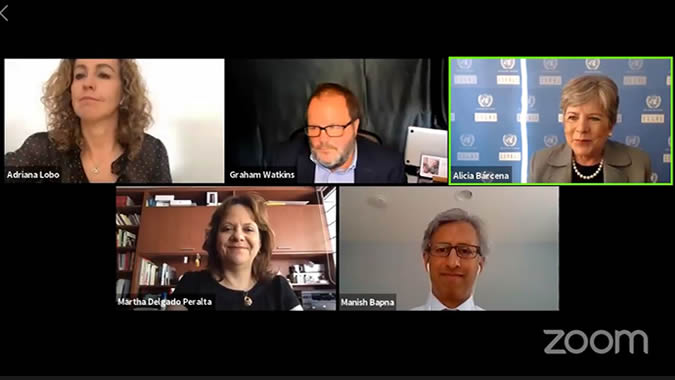Alicia Bárcena Calls for Moving towards a New Development Paradigm that Closes the Social Gap with a Rights-based Approach and that Respects the Planet’s Limits
Work area(s)
ECLAC’s Executive Secretary participated today in the event “Sustainable Revolution: Dialogues for Recovery, Resilience and Equity,” where she urged for a new “multicolored” deal for the post-pandemic economic reactivation.

The old development paradigm is insufficient and obsolete. It is not enough to grow, we need a new paradigm that not only aims to make incomes converge but also to close the social gap with a rights-based approach while respecting the planet’s limits, Alicia Bárcena, Executive Secretary of the Economic Commission for Latin America and the Caribbean (ECLAC), affirmed today.
The senior United Nations official participated in the event Sustainable Revolution: Dialogues for Recovery, Resilience and Equity, organized by the Mexico office of the World Resources Institute (WRI Mexico) in conjunction with the World Wildlife Fund (WWF), German Cooperation for Sustainable Development in Mexico (GIZ), the Inter-American Development Bank (IDB), the Climate Initiative of Mexico (ICM), and ECLAC.
Alicia Bárcena spoke on a high-level panel entitled “Sustainable Revolution: The global challenge of addressing the economic, social and environmental crisis,” along with Martha Delgado, Undersecretary for Multilateral Affairs and Human Rights of Mexico; Manish Bapna, Executive Vice President of WRI; and Graham Watkins, Head of the IDB’s Climate Change Division. Adriana Lobo, Executive Director of WRI Mexico, acted as moderator.
In her remarks, ECLAC’s Executive Secretary sustained that if the destruction of the environment is the main physical threat to the continuity of development, inequality is its main obstacle or political threat.
She underscored that the new development model must have the three equilibriums – economic, social and environmental – at its center, and she warned that transformation is urgently needed for building back better with resilient, inclusive and sustainable economies.
ECLAC’s highest authority recalled that the world can turn to the 2030 Agenda, a road map that is “historic, transformative, which includes universal, comprehensive and indivisible goals, which is participatory and presents a vision of a future with equality and sustainability at the center.”
She added that the post-pandemic economic recovery should be focused on low-carbon sectors that also create jobs and environmental resilience. To that end, countries should prioritize sectors to move towards the big push for sustainability that ECLAC defends, an approach based on coordinating policies to mobilize and accelerate sustainable investments that promote a new virtuous cycle of economic growth that would generate employment and income and reduce inequalities and structural gaps, while preserving and regenerating the natural resources base on which development depends.
Alicia Bárcena stated that COVID-19 has made the economic model’s structural problems visible, making it urgently necessary to reformulate social security and welfare (social protection systems) and ensure quality social services for all. In the region, 48% of people have neither healthcare nor social protection and labor informality stands at 54%, she said.
Furthermore, Latin America and the Caribbean must reduce technological gaps and heterogeneity in production with active industrial policies and boost productivity, while also redirecting investment to foster ecological transformation and ensure countries’ resilience in the face of extreme environmental events.
“The region must also improve the institutional system’s quality. We must address corruption and increase citizen trust in public institutions. We have to put an end to the culture of privileges. The Escazú Agreement, the first treaty in the entire world that protects the human rights of environmental activists, takes us in that direction,” she stated.
The senior UN official called for forging compacts for a more sustainable or green recovery via a new production-society-environment equation, a stronger welfare state with universal social protection and with citizen incomes that aspire to becoming universal, and better international governance that would include the economic dimension in the multilateral framework and metrics to calculate the quality of development, not just economic vigor.
“What we want is a New Green Deal, but I don’t want to call it green, because it should be a multicolored deal that includes women and financing as well,” she emphasized.
Type
Country(ies)
- Latin America and the Caribbean